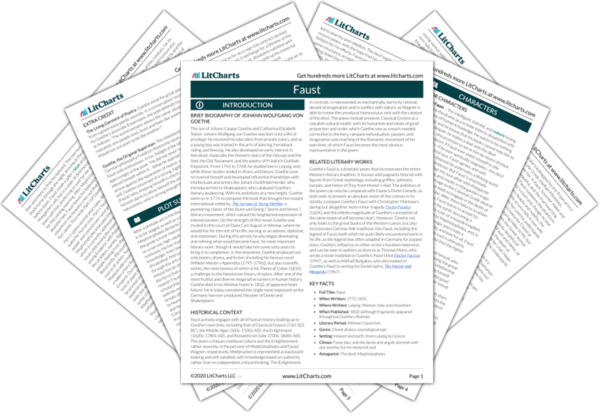Early in the play, Faust studies the sign of the Macrocosm, which presents to him the whole universe in its harmonious unity, all of its parts related to one another and to the whole that they make up. Although this vision ultimately leaves Faust desiring more, the ability to act and not just contemplate, it is nonetheless central to an understanding of Faust. Essentially everything good that occurs in the play results when actions are carried out harmoniously, with their whole context in mind, while bad results arise when actions are carried out as though they were wholes in themselves and not merely parts. In other words, the play privileges the macrocosmic (universal) over the microcosmic (individual) perspective. Even the structure of the play emphasizes this principle: the “Prelude on the Stage” reminds us of the economic and theatrical contexts of Faust, while the “Prologue in Heaven” reminds us that what happens on earth, like the tragedy of Faust itself, is only a symbol, to Goethe’s mind, of the divine whole which contains all of nature and all of us.
The Lord of all creation, God Himself, has the ultimate macrocosmic perspective of the world, understanding as he does how all the parts of His creation relate to and harmonize with the whole, from heaven to earth to hell. Even the most negative part of His creation, Mephistopheles, ultimately does macrocosmic good while he attempts to perform evil. Faust’s desire for transcendence is essentially a desire to wholly understand the macrocosm and act in harmony within it. Ironically enough, this desire brings him into conflict with the world, as when he orders the devil and the Three Mighty Men to seize Baucis and Philemon’s cottage and the lands surrounding it. The episode epitomizes the folly of acting without a fuller consciousness of one’s context—it is foolish, after all, to send the devil out on a peaceful errand (Mephistopheles ends up killing Baucis and Philemon), just as it’s foolish to act shortsightedly, as the Emperor so often does, in printing paper money and falling into a life of wanton pleasure. Faust’s tragedy, his dissatisfaction with life which leads him into crime and which follows him to his death, comes about to a large extent because no single person can hold the world in their head and their hand, yet Faust attempts to do exactly this. Thus the drama suggests that one should strive tirelessly to understand the world, but with a sense of one’s limitations, or, put another way, a sense of the fact that one is but a small part of the whole.
Parts, Wholes, and Limits ThemeTracker

Parts, Wholes, and Limits Quotes in Faust
When Nature, unconcerned, twirls her endless thread
and fixes it upon the spindle,
when all creation’s inharmonious myriads
vex us with a potpourri of sound,
who then divides the strand monotonously unreeling
and gives it life and rhythmic motion,
who summons single voices to the general choir
where music swells in glorious accord?
So now upon our modest stage act out
creation in its every aspect,
and move with all deliberate haste
from heaven, through the world, to hell!
Angels gain comfort from the sight,
though none can fully grasp Your Being,
and all the grandeur You have wrought
still has the splendor of its primal day.
No dog would want to linger on like this!
That is why I’ve turned to magic,
in hope that with the help of spirit-power
I might solve many mysteries,
so that I need no longer toil and sweat
to speak of what I do not know,
can learn what, deep within it,
binds the universe together,
may contemplate all seminal forces—
and be done with peddling empty words.
How all things interweave as one
and work and live each in the other!
…
How grand a show! But still, alas! mere show.
Infinite Nature, when can I lay hold of you
and of your breasts?
[I am] a part of that force
which, always willing evil, always produces good.
Take my word for it, anyone who thinks too much
is like an animal that in a barren heath
some evil spirit drives around in circles
while all about lie fine green pastures.
Great folk may like the noisy life,
we’ll be quite cozy in this quiet spot.
Besides, it is an ancient practice
to make your own small worlds inside the great one.
That merit and good fortune are connected
is something that these idiots will never see;
the philosopher’s stone could be in their possession,
but there’d be no philosopher to use it.
You are the father of all mystagogues
who ever cheated docile neophytes,
but you reverse their method—send me to a void
for higher wisdom and for greater powers.
You’re making me the cat whose task it is
to pull your chestnuts from the fire.
But do not stop! Let’s probe the matter fully,
since in your Nothingness I hope to find my All.
You’ll never learn unless you make mistakes.
If you want to exist, do so on your own!
If only I might see that people’s teeming life,
share their autonomy on unencumbered soil;
then, to the moment, I could say:
tarry a while, you are so fair—
the traces of my days on earth
will survive into eternity!—
Envisioning those heights of happiness,
I now enjoy my highest moment.
















